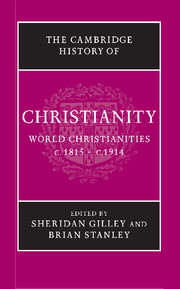Book contents
- Frontmatter
- 1 Introduction
- PART I CHRISTIANITY AND MODERNITY
- 2 The papacy
- 3 Theology and the revolt against the Enlightenment
- 4 The growth of voluntary religion
- 5 Catholic revivalism in worship and devotion
- 6 Women preachers and the new Orders
- 7 Church architecture and religious art
- 8 Musical trends and the western church: a collision of the ‘ancient’ and ‘modern’
- 9 Christianity and literature in English
- 10 Christian social thought
- 11 Christianity and the sciences
- 12 History and the Bible
- 13 Popular religion and irreligion in countryside and town
- PART II THE CHURCHES AND NATIONAL IDENTITIES
- PART III THE EXPANSION OF CHRISTIANITY
- Select General Bibliography
- Chapter Bibliography
- Index
- References
11 - Christianity and the sciences
from PART I - CHRISTIANITY AND MODERNITY
Published online by Cambridge University Press: 28 March 2008
- Frontmatter
- 1 Introduction
- PART I CHRISTIANITY AND MODERNITY
- 2 The papacy
- 3 Theology and the revolt against the Enlightenment
- 4 The growth of voluntary religion
- 5 Catholic revivalism in worship and devotion
- 6 Women preachers and the new Orders
- 7 Church architecture and religious art
- 8 Musical trends and the western church: a collision of the ‘ancient’ and ‘modern’
- 9 Christianity and literature in English
- 10 Christian social thought
- 11 Christianity and the sciences
- 12 History and the Bible
- 13 Popular religion and irreligion in countryside and town
- PART II THE CHURCHES AND NATIONAL IDENTITIES
- PART III THE EXPANSION OF CHRISTIANITY
- Select General Bibliography
- Chapter Bibliography
- Index
- References
Summary
Cognitive dissonance about cosmogony
Among the different possible approaches to Christianity and the sciences is that of the Christian conduct of science, involving a study of Christian scientists, their scientific accomplishments, and the importance of religious upbringing and beliefs for the character of scientific subjects and theories. This approach was followed as early as the closing decades of the period 1815–1914, when a Lutheran theologian at the Universityof Greifswald, Otto Zöckler (1833–1906), produced his two-volume Gottes Zeugenim Reich der Natur (1881), and when from the Catholic side Das Christentum und die Vertreter der neueren Naturwissenschaft (1903; English trans. 1911; new edition 1995), by the Jesuit church historian Karl Alois Kneller (1857–1942), was published. Yet apart from a number of biographical studies of individual Christian scientists, ‘few attempts to pursue this link between religion and science’ have been made since. The majority of studies of ‘Christianity and the sciences’ have focused on the converse, namely the impact of scientific discoveries and theories on Christian beliefs, in particular on biblical hermeneutics and the question of the historicity, inerrancy and literal-versus-symbolic meaning of Genesis. Nearly all the primary sources of the period of this chapter as well as the secondary ones, up to the present day, have been preoccupied with what James Moore – following Leon Festinger – has called the ‘cognitive dissonance’ that developed between the ‘Mosaic cosmogony’ and the scientific study of origins – of the universe, of life and of humankind.
- Type
- Chapter
- Information
- The Cambridge History of Christianity , pp. 164 - 180Publisher: Cambridge University PressPrint publication year: 2005

